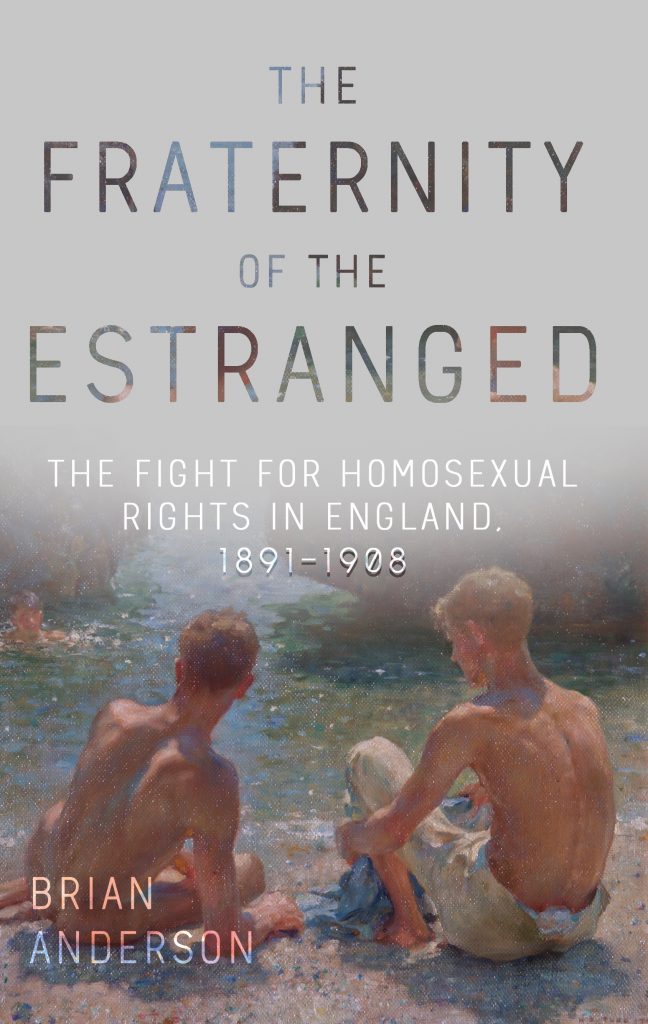Originally passed in 1885, the law that made homosexual relations between men a crime remained in place for 82 years. But during this time, restrictions on same-sex relationships did not go unchallenged. Between 1891 and 1908, three books on the nature of homosexuality appeared. They were written by two homosexual men: Edward Carpenter and John Addington Symonds, and a third, Havelock Ellis. NOTCHES recently spoke to Brian Anderson about his new book The Fraternity of the Estranged: The Fight for Homosexual Rights in England, 1891-1908.
NOTCHES: In a few sentences, what is your book about? Why will people want to read it?
Anderson: My book is concerned with the inter-related lives and works of three individuals who wrote during the relatively short period between the high point of moralistic medical theorising on homosexuality and the emergence of ethically neutral models of human sexuality.
Between 1891 and 1908 three texts appeared in England, written by Edward Carpenter, John Addington Symonds and Havelock Ellis. They were the first English contributions to the scientific understanding of homosexuality and opened the long fight for the legal recognition of sex between men in private, finally achieved for England and Wales in 1967.

My book is innovative. The fortuitous circumstances under which these men came to know each other, and how these books came to be written, has not before been comprehensively documented. Through a combination of history, biography and textual analysis, the book recounts the hazardous progress of these works from inception to publication, and their reception by a society in which men who loved men were pushed to the margins. It also offers an intimate glimpse of what it was like to be homosexual in late-Victorian England.
NOTCHES: What drew you to this topic, and what are the questions do you still have?
Anderson: My interest in the history of human sexuality was stirred by regularly passing a large Regency house in Brunswick Square, Brighton bearing a plaque naming it as the former home of Edward Carpenter. Who was this man, I asked myself, described on the plaque simply as an author?
What began as an interest in one man led to the uncovering of connections with Symonds and Ellis, and their joint contributions to sexual modernism and homosexual emancipation.
I believe that this history matters. Although the book shadows contemporary academic research on homosexuality, my motive in writing it was, particularly, to bring Carpenter and Symonds out of the ‘closet’, as important but little-known individuals in England’s gay history. I wrote it with the LGBT community in mind, and, at a time more accepting of sexual diversity, for the enlightenment of the wider public.
NOTCHES: Whose stories or what topics were left out of your book and why? What would you include had you been able to?
Anderson: I would have liked to have woven in much more intimate biographical material on Carpenter and Symonds (as well as Ellis), but this would have unbalanced an intentionally focussed work.
NOTCHES: This book is clearly about the history of sex and sexuality, but what other themes does it speak to?
Anderson: For this period, my book covers some of the principal themes found in Goldsmiths MA in Queer History, such as forms of resistance, prosecutions and pathologisations. As well as the specific focus on homosexuality, there are other elements in the book, such as gender and the ‘new woman’ question. Carpenter was heavily involved with women’s issues, and one of the first to argue for the breaking of the link between sex and procreation.
NOTCHES: Your book is published, what next?
Anderson: What next? I have been a bit of a gadfly. I wrote my doctorate on Mill’s utilitarianism, but having left academe shortly after it remains unpublished, a testimony to my youthful enthusiasm for intellectual history. Whatever comes next will not stray far from this field.
 Brian Anderson is an independent researcher. Following his doctorate in intellectual history from the University of Oxford, teaching and research management posts, he left higher education to pursue other interests.
Brian Anderson is an independent researcher. Following his doctorate in intellectual history from the University of Oxford, teaching and research management posts, he left higher education to pursue other interests.

NOTCHES: (re)marks on the history of sexuality is licensed under a Creative Commons Attribution-NonCommercial-NoDerivatives 4.0 International License.
Based on a work at www.notchesblog.com.
For permission to publish any NOTCHES post in whole or in part please contact the editors at NotchesBlog@gmail.com




